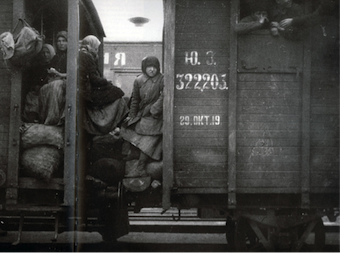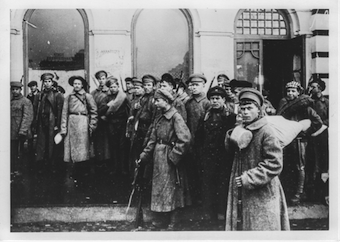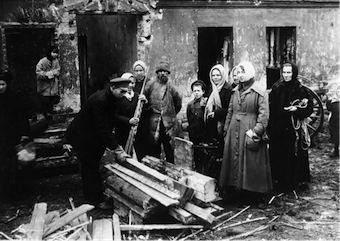

|
War Communism  Refugees War Communism was the first version of the Soviet planned economy. It aimed to abolish private trade, control labour, nationalize all large-scale industry, and at its height in 1920 to replace the money system with a universal system of state rationing. The system had its roots in the grain monopoly, introduced on 9 May 1918 in response to the urban food crisis. Millions fled the hungry cities and travelled to the countryside to barter with the peasants or live closer to the sources of food. The great industrial cities of the north - the power-base of the Bolsheviks - lost half their population between 1918 and 1920. The Bolsheviks became the vanguard of a disappearing working class.  A Bolshevik requisitioning brigade By the grain monopoly all the peasants' harvest surplus became state property. Armed brigades were sent into the villages to requisition grain by force. Where they found none (usually because there were no surpluses) it was assumed that it was being hidden by 'kulaks' - the phantom class of 'capitalist' peasants invented by the Bolsheviks - and a war for the grain began. The brigades beat and tortured peasants until the required amount of grain was handed over. There were hundreds of peasant uprisings against the requisitioning. The Bolsheviks reacted by tightening their policies. In January 1919 they replaced the grain monopoly with a general Food Levy (prodrazverstka) which extended the monopoly to all foodstuffs and took away the powers of the local food organs to set the levies in accordance with the harvest estimates: henceforth Moscow would take what it needed from the peasantry without any calculation as to whether it was taking its last stocks and food and seed.  Distributing fuel rations EXTRACT FOR SUBSCRIBERS ONLY. Orlando Figes, A People's Tragedy: The Russian Revolution, 1891-1924 (Pimlico, 1997), p. 612-615. ...The origins of War Communism have long been a subject of intense debate between historians. To those on the Left it was essentially a pragmatic response to the military exigencies of the civil war; while to those on the Right it was derived directly from Leninist ideology. The argument has broader implications for the nature and development of the Soviet regime... [FULL TEXT 1286 WORDS] |
© 2014 Orlando Figes | All Rights Reserved